Ethiopia
Ethiopia fired its prisons chief and took three opposition groups off its “terrorist” list on Thursday, the latest steps in Prime Minister Abiy Ahmed’s bold push to shake the African giant from decades of security-obsessed rule.
The sacking of the head of the prison service, along with four senior colleagues, came hours before a Human Rights Watch report that detailed torture at one notorious prison and urged the government to hold officials to account.
Announcing the dismissals, Attorney General Berhanu Tsegaye said prison officers must respect individual rights outlined in the constitution, a rare public rebuke to the country’s security apparatus.
His remarks echoed Abiy’s stunning criticism of security forces last month in which the 41-year-old, who holds a doctorate in peace and security studies, acknowledged widespread police brutality and likened it to state terrorism.
“Does the constitution stipulate that prisoners should be flogged and beaten? It does not,” he told a televised sitting of parliament. “Police flogged. This is unconstitutional. Police were terrorists.”
Abiy’s remarkable 100 days
In office for just three months, Abiy has turned politics on its head in the Horn of Africa nation of 100 million.
Foremost among his reforms was the launch last month of peace talks with neighbour and sworn enemy Eritrea, against whom Ethiopia waged a 1998-2000 border war in which 80,000 people are thought to have died.
Ethiopia PM appeals for unity, pledges democracy and improved relations with Eritrea
He has also rescinded a state of emergency and announced plans to partially open up the economy, including attracting foreign capital into the state-run telecoms company and national airline, both mouth-watering investment prospects given Ethiopia’s size and pacy growth.
Following the recent release of political prisoners, parliament ruled on Thursday the Oromo Liberation Front and the Ogaden National Liberation Front, two secessionist groups, and the ‘Ginbot 7’, an exiled opposition movement, were no longer “terrorist” groups.
The shake-up by the multi-lingual former soldier from the Oromo ethnic group, Ethiopia’s largest, has won plaudits from Asmara to Washington and drawn comparisons to the 1980s ‘perestroika’ reforms of Soviet leader Mikhail Gorbachev.
Resistance to reforms
However, it has also attracted opposition from hardliners in the Tigrayan People’s Liberation Front (TPLF), the ethnic Tigrayan party that has dominated the ruling EPRDF coalition, and by association the country and economy – for nearly three decades.
Two people were killed in a grenade blast at a massive pro-Abiy rally in Addis Ababa last month, with the finger of blame pointed at those opposed to his reform drive.
There has been no claim of responsibility but the attack underscored the scale of Abiy’s challenge and raised fears, including from Eritrean President Isaias Afwerki that Ethiopia’s new leader may not prevail.
“Ethiopia is now at a turning point or transition. What is the destination? How will this be achieved?” Isaias said last month in Asmara’s first response to Abiy’s peace overtures.
The Tigray factor
In Tigrayan areas near the Eritrean border, locals criticised Abiy’s olive branch to Asmara, while the TPLF warned that it would “not take part in any process that harms the people of Tigray”.
Ethiopia-Eritrea reconciliation project meets resistance from border communities
It later struck a more conciliatory tone, saying it welcomed Eritrea’s positive response to Abiy’s overtures. However, some former top-level ‘securocrats’ are not going quietly.
Major-General Teklebrhan Woldearegay, who quit as head of the INSA cyber-security agency in April, told a Tigrayan radio station this week Abiy was “being undemocratic and acting like a king”.
Gebreyesus Gebregziabher, the axed prisons chief, is a TPLF member while his replacement is from Abiy’s party, the Oromo People’s Democratic Organisation.
Abiy was elected to the helm of the four-party EPRDF in March after three years of violent protests by ethnic Oromo and other groups who felt they were being exploited and abused in an economic development drive.
[Photos] Ethiopia’s explosive ‘In Abiy We Trust’ rally
REUTERS



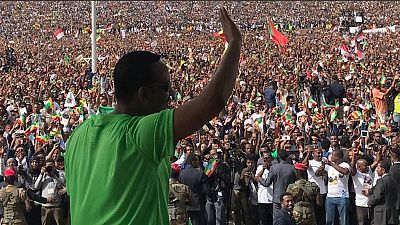

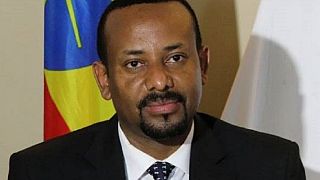
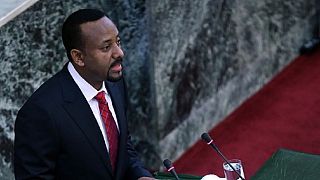
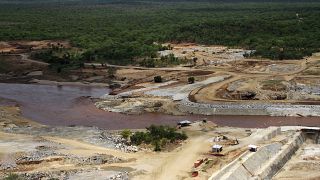
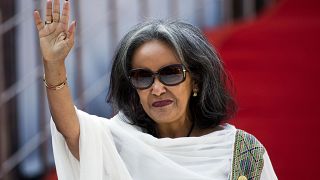




00:58
Somaliland opposition leader wins presidential poll
11:07
Botswana's new government races to diversify its economy {Business Africa}
01:51
Meet the churches welcoming migrants across the world and championing diversity
Go to video
Ethiopian runner Yomif Kejelcha breaks men's half-marathon world record
01:38
Malaysia, Ethiopia agree to strengthen bilateral ties
00:41
Ethiopian PM Abiy Ahmed meets Putin at BRICS Summit, pushes for stronger trade ties